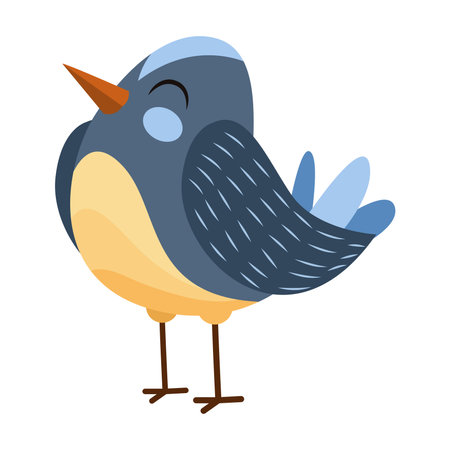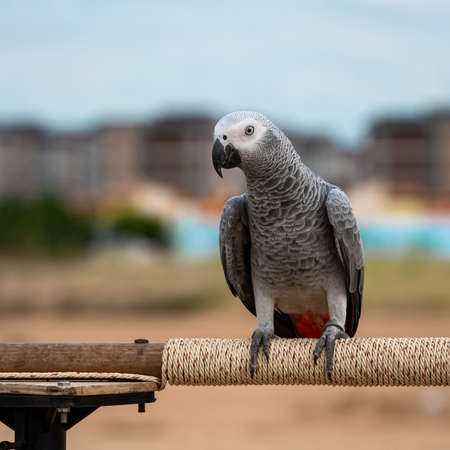1. Recognizing Signs of Aging in Your Bird
As your feathered friend gets older, you might notice some changes that show they are entering their golden years. Just like people, birds experience aging in a variety of ways. Spotting these signs early can help you support your pet and keep them happy and active for as long as possible.
Common Signs of Aging in Pet Birds
Birds often hide illness or weakness, so it’s important to pay close attention to subtle changes. Here are some key things to watch for:
| Sign | What to Look For |
|---|---|
| Behavioral Changes | Your bird may become less social, sleep more, or lose interest in playing with toys or interacting with family members. |
| Lower Energy Levels | You may notice your bird is not as eager to fly, climb, or explore their cage as before. They might tire easily after normal activities. |
| Changes in Appearance | Feathers could appear dull, less vibrant, or there may be more frequent molting. You might also see overgrown beaks or nails. |
| Eating Habits | An older bird might eat less or show preference for softer foods. Sudden weight loss or gain should be noted. |
| Mobility Issues | Aging birds sometimes have trouble perching, climbing, or balancing. They might sit on the bottom of the cage more often. |
How to Monitor Your Bird’s Health at Home
- Observe daily: Spend a few minutes each day watching how your bird moves and interacts with its environment.
- Keep records: Make notes of any changes in eating, activity levels, or appearance so you can share this information with your avian vet if needed.
- Weigh regularly: Use a small scale to monitor your bird’s weight once a week, since fluctuations can indicate health issues.
When Should You Contact an Avian Vet?
If you notice sudden changes in your bird’s behavior, appetite, or physical condition—especially if they seem weak or stop eating—reach out to a veterinarian who specializes in birds. Early intervention can make a big difference in quality of life for senior pets.
2. Providing a Nutritious Diet for Senior Birds
Why Your Aging Bird’s Diet Needs Change
Just like people, birds’ nutritional needs can shift as they get older. A senior bird might not digest food as easily, or may become more prone to health problems like obesity or vitamin deficiencies. Adjusting their diet is one of the best ways to help them stay healthy and active.
Key Foods for Older Birds
As your bird ages, focus on offering foods that are easier to eat and full of nutrients. Here’s a simple guide:
| Food Type | Why It Helps | Examples |
|---|---|---|
| Pellets (Senior Formulas) | Balanced nutrition, easy to chew | Harrison’s Adult Lifetime, Roudybush Maintenance |
| Fresh Veggies & Fruits | Vitamins, hydration, fiber | Kale, carrots, apples (no seeds), berries |
| Cooked Grains & Legumes | Gentle on digestion, protein source | Lentils, brown rice, quinoa (plain) |
| Healthy Seeds & Nuts (in moderation) | Good fats, energy boost | Walnuts, flaxseed, pumpkin seeds |
| Softened Foods | Easier for weak beaks or missing teeth | Mash veggies, soak pellets in warm water |
Supplements for Senior Birds
Your vet may recommend adding certain supplements to your bird’s diet. Common options include:
- Calcium: Supports bone health; especially important for female birds.
- Vitamin D: Helps absorb calcium—essential if your bird doesn’t get direct sunlight.
- Probiotics: Aid digestion and gut health.
- Omega-3s: Found in flaxseed oil or hemp oil; supports heart and brain function.
Hydration Tips for Older Birds
Aging birds are more likely to get dehydrated, especially if they eat more dry food. Here’s how you can help:
- Offer fresh water daily.
- Add water-rich foods: Cucumber, melon, and leafy greens can boost hydration.
- If needed, use a shallow dish instead of a bottle: Some older birds find it easier to drink from a bowl than from a sipper bottle.
- Mist your bird lightly with water during hot days: This helps keep their skin and feathers hydrated.
A Note About Treats and Human Food
Treats are okay in small amounts but avoid salty snacks, chocolate, caffeine, avocado, and onion—these are toxic to birds. Stick with safe treats like bits of apple or unsalted popcorn.

3. Exercise and Enrichment Activities
Keeping your aging bird active and engaged is key to their health and happiness. Just like people, older birds benefit from regular movement and mental stimulation. Below, youll find safe and fun ways to help your feathered friend stay sharp and fit.
Safe Exercise for Senior Birds
As birds age, they may not move as quickly or climb as much as they used to. It’s important to encourage gentle exercise that matches their abilities. Try these activities:
| Activity | Benefits | Tips for Safety |
|---|---|---|
| Short, supervised flights | Keeps muscles strong, boosts mood | Remove hazards, close windows/doors |
| Ladder or perch climbing | Improves balance and coordination | Use sturdy perches at different heights; avoid steep angles |
| Interactive playtime outside the cage | Encourages exploration and curiosity | Stay nearby, use bird-safe toys only |
| Gentle stretching with treats | Promotes flexibility and bonding | Offer treats at different spots to motivate movement |
Mental Stimulation: Keep Their Minds Busy
Boredom can lead to stress or unwanted behaviors in aging birds. Provide enrichment activities that are easy but interesting:
- Puzzle Feeders: Hide treats inside bird-safe puzzle toys to challenge your birds mind.
- Foraging Opportunities: Place favorite foods in paper cups or crumpled paper for them to find.
- New Sounds & Scents: Play gentle music or introduce safe new scents (like fresh herbs) near the cage.
- Toy Rotation: Change out toys every week to keep things fresh and exciting.
- Social Interaction: Spend time talking, whistling, or singing with your bird daily.
Create an Enrichment Schedule
A simple weekly schedule can help you remember to mix up activities and keep things interesting for your bird. Here’s an example you can try:
| Day of Week | Main Activity | Mental Enrichment Idea |
|---|---|---|
| Monday | Ladder Climbing Practice | Puzzle Feeder with Favorite Treats |
| Tuesday | Supervised Out-of-Cage Time | Play Soft Music Near Cage |
| Wednesday | Treat-Based Stretching Game | Add New Safe Toy to Cage |
| Thursday | Ladder Climbing Practice | Scent Introduction (fresh herbs) |
| Friday | Short Flight Sessions (if able) | Toy Rotation Day |
| Saturday & Sunday | Mix of Above Activities—Focus on Fun! | Extra Social Time with Family Members |
Your Role as a Caregiver
Your attention and creativity are the best tools for keeping your aging bird active and happy. Always watch for signs of fatigue or discomfort, and adjust activities as needed. With a little planning, you can make every day enriching for your feathered companion!
4. Regular Health Check-Ups with an Avian Vet
Why Routine Vet Visits Matter for Older Birds
Just like people and other pets, birds need regular medical check-ups, especially as they age. Aging birds are more likely to develop health problems that can go unnoticed until they become serious. Scheduling routine wellness exams with an avian veterinarian helps catch issues early and gives your bird the best chance to stay healthy and active.
What Happens During a Wellness Exam?
An avian vet visit is more than just a quick look at your bird. Here’s what you can usually expect during a check-up:
| Exam Step | What It Involves |
|---|---|
| Physical Exam | The vet will look at your bird’s eyes, beak, feathers, feet, and body condition to spot any signs of illness or injury. |
| Weight Check | Your bird will be weighed to track any changes that might signal health problems. |
| Beak, Nail & Feather Care | The vet may trim nails or beak if needed and check feather quality. |
| Lab Tests | The vet might recommend bloodwork or fecal tests to check for infections or organ function, especially in senior birds. |
| Diet & Lifestyle Review | You’ll talk about what your bird eats and how much activity it gets to make sure its needs are being met as it ages. |
How Often Should You Schedule Exams?
For most aging birds, it’s recommended to see an avian vet at least once a year. If your bird has known health issues, more frequent visits may be necessary. Ask your veterinarian what schedule is best for your specific species and pet’s condition.
Tips for a Stress-Free Vet Visit
- Use a secure carrier lined with familiar bedding or toys.
- Bring a small sample of your bird’s usual food or treats for comfort.
- Let the vet know about any recent changes in behavior or appetite.
- Stay calm; birds can pick up on your stress!
5. Creating a Senior Bird-Friendly Environment
As birds get older, their needs change and making your home comfortable and safe for them is key to keeping them healthy and happy. Here are some practical tips to help you set up a senior bird-friendly environment.
Modify the Cage for Easy Access
Aging birds may have trouble climbing or flying like they used to. Consider these simple cage modifications:
| Modification | Why It Helps |
|---|---|
| Add more perches at different heights | Makes it easier for your bird to move around without jumping or flying far |
| Use thicker, softer perches | Easier on aging feet and joints, helps prevent arthritis pain |
| Install ramps or ladders | Allows birds with weak legs or balance issues to move safely between levels |
| Lower food and water dishes | Prevents falls and makes eating/drinking less tiring |
| Remove sharp toys or objects | Reduces injury risk if your bird loses balance |
Keep the Temperature Comfortable
Older birds are more sensitive to temperature changes. Keep their cage away from drafts, air conditioners, or direct sunlight. The ideal room temperature for most pet birds is between 70°F–80°F (21°C–27°C). If your house gets cold in winter, use a bird-safe heater near the cage or cover part of the cage at night to keep warmth in.
Tip:
If your bird likes to bathe, make sure the water is lukewarm—not cold—to prevent chills.
Create a Calm, Safe Space
- Place the cage in a quiet area of your home where your bird can watch family activities but isn’t overwhelmed by noise.
- Avoid sudden loud sounds or quick movements that could startle your senior bird.
- Make sure other pets can’t reach into the cage.
Use Soft Lighting and Maintain a Routine
Good lighting helps older birds see better, but avoid harsh lights. Try using soft, natural light during the day and dimming lights at night. Birds thrive on routine, so keep feeding and playtimes consistent each day.
Quick Checklist for a Senior Bird-Friendly Home:
- Cage is secure, clean, and easy to access for both you and your bird
- No dangerous toys or sharp edges inside the cage
- Cage is placed away from windows, drafts, and busy doorways
- Bedding is soft and easy to clean for comfort and hygiene
- Your bird has a cozy spot to rest when tired
With these simple changes, you can help your aging feathered friend enjoy their golden years safely and comfortably right at home.


